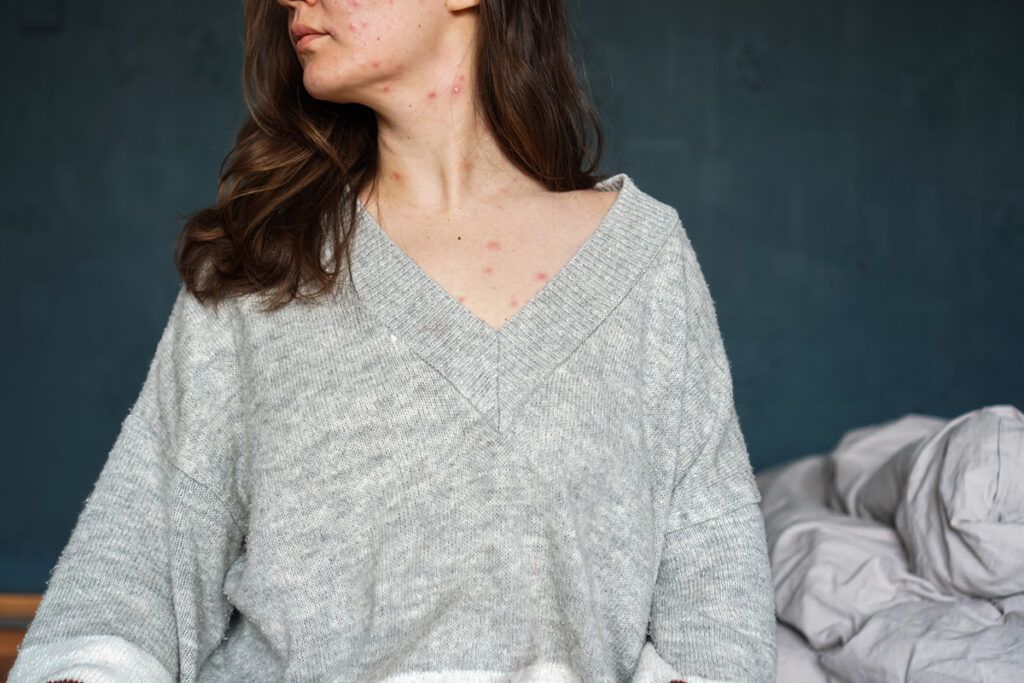Chickenpox is an infection caused by the varicella-zoster virus (VZV). It’s easily transmitted and can lead to symptoms such as an itchy rash of fluid-filled blisters.
Most people will get chickenpox at least once in their life, and it typically affects children. Children will often experience a milder illness, especially if they have received the chickenpox vaccine. However, in some cases, it can occur later, when you’re an adult, or you may get the infection twice.
If you get chickenpox as an adult, it can put you at a higher risk for severe illness and complications.
What are the stages of adult chickenpox?

Chickenpox causes similar symptoms in adults and children. The illness starts with a prodrome period that lasts 1–2 days when you may experience fatigue, headache, fever, and appetite loss.
After this early stage, a rash appears. The rash typically turns into blisters that may appear anywhere on the body, including:
- chest
- back
- face
- genitals
The blisters are filled with fluid and can be very itchy. They may appear red on lighter skin tones, but there may be less distinction between the blister color and the surrounding skin on darker skin tones.
The blisters will eventually dry out and become scabs. Although the illness usually lasts 4–7 days, it can take about a week for all the blisters to become scabs.
If you’ve had one or two doses of the chickenpox vaccine, it’s still possible to get chickenpox. However, the symptoms may be milder, and the illness won’t last as long.
With both doses of the vaccine, you may get fewer than 50 lesions, and they may be flat instead of filled with pus. The illness may not last as long and there probably won’t be a fever. If there is a fever, it’s likely to be mild.
According to the Centers for Disease Control and Prevention (CDC), 25–30% of people who receive just one dose of the chickenpox vaccine will have more serious symptoms, similar to those who have not had any doses.
Risk factors of chickenpox in adults
Adults are at higher risk for more severe chickenpox illness. Severe chickenpox can also cause serious complications.
Adults who are at particularly high risk for severe illness include:
- those who have an immunocompromised condition, such as systemic lupus erythematosus and inflammatory bowel disease
- those on immunosuppressant medications, such as chemotherapy
- pregnant people
These individuals may be at lower risk if there is evidence they have immunity to chickenpox.
The complications of severe chickenpox illness can lead to hospitalization and can be life threatening.
They include:
- pneumonia
- serious bacterial infections
- infection of the brain
- swelling of the brain
- sepsis
- dehydration
Pneumonia is the most common complication of chickenpox infection in adults.
Why is it important to get vaccinated?
Getting vaccinated against chickenpox is important given how easily the virus spreads. According to the CDC, when someone has chickenpox, up to 90% of those who are close to them get the virus as well if they aren’t already immune.
If you get the chickenpox vaccine, you’re less likely to develop a severe case of chickenpox. You may also avoid getting shingles, a condition where the chickenpox virus reactivates in the body and causes a serious and painful rash.
There are two chickenpox vaccines in the United States: Varivax and ProQuad.
- Varivax contains only chickenpox vaccine
- ProQuad contains chickenpox (varicella), measles, mumps, and rubella vaccine
The FDA has not approved ProQuad for use in adults. It’s also called the MMRV vaccine. It’s only for children ages 1–12 years.
The FDA has approved Varivax for use in people ages 1 year and older.
People who cannot receive the vaccine but are at high risk for chickenpox infection can get varicella-zoster immune globulin (VariZIG). VariZIG can help prevent chickenpox or decrease its severity.
Managing symptoms at home
If you have chickenpox, you can take steps at home to help manage symptoms and lower the risk of skin infection.
Steps include:
- bathing in a cool bath with baking soda or uncooked oatmeal to relieve itching
- soothing itchy skin with calamine lotion
- trimming fingernails or wearing gloves to prevent scratching
- trying not to irritate or scratch blisters as this can lead to skin infection
- washing hands with soap and water for 20 seconds if you scratch a blister
- taking acetaminophen (Tylenol) for pain
Treatment options for chickenpox in adults
If you’re an adult with chickenpox, a doctor may recommend an oral antiviral medication in addition to home treatment. The antiviral medications typically prescribed for chickenpox are:
- acyclovir (Zovirax)
- famciclovir (Famvir)
- valacyclovir (Valtrex)
If you have severe chickenpox illness or complications, a doctor may recommend intravenous acyclovir.
Some people may have an acyclovir-resistant strain of chickenpox. In this case, a doctor may recommend foscarnet (Foscavir).
If you need help covering the cost of medications, the free Optum Perks Discount Card could help you save up to 80% on prescription drugs. Follow the links on drug names for savings on that medication, or search for a specific drug here.
